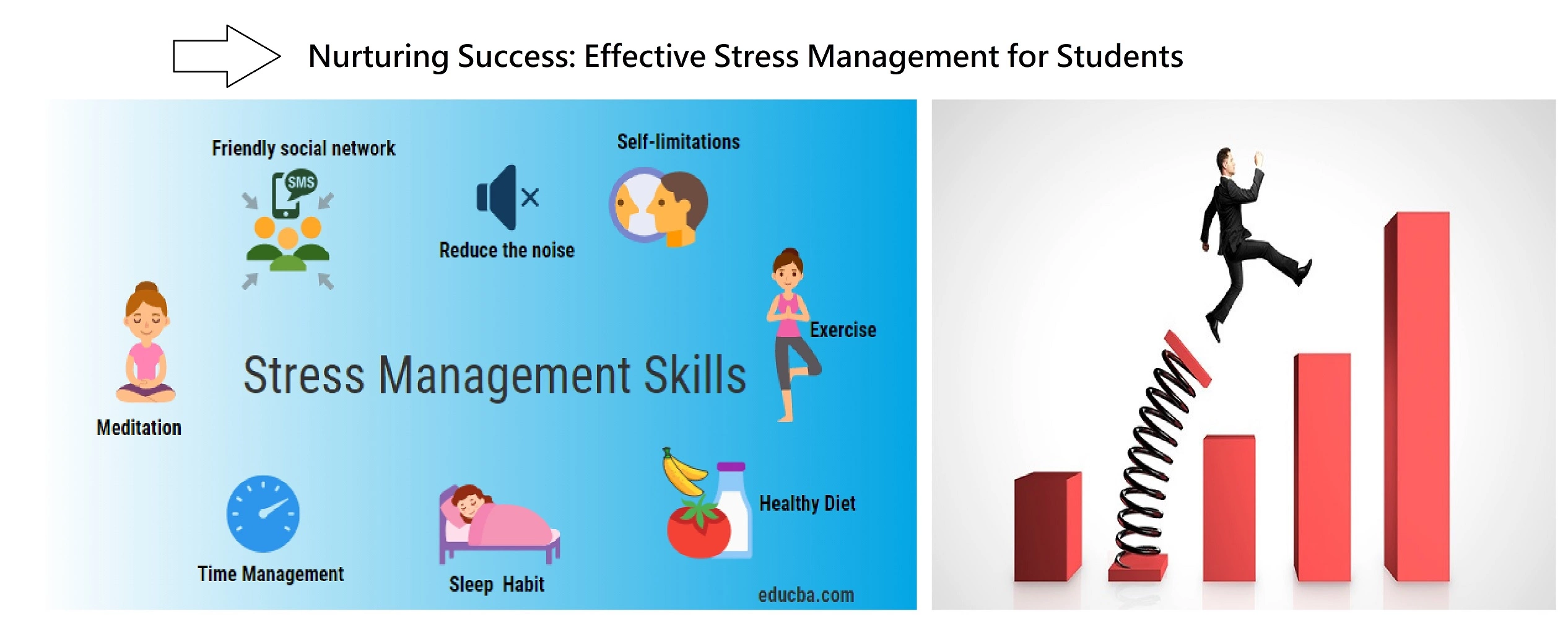Home » Nurturing Success: Effective Stress Management for Students

As students navigate through the demanding landscape of academics, extracurricular activities, and personal responsibilities, stress can become a common companion. While a certain degree of stress can be motivating, excessive stress can hinder academic performance, emotional well-being, and overall quality of life. Developing effective stress management techniques is crucial for students to maintain a healthy balance and achieve their full potential. In this blog, we will explore some practical strategies that can help students cope with stress and thrive in their educational journey.
One of the key factors contributing to stress among students is poor time management. Creating a structured schedule can help prioritize tasks and allocate time efficiently. Break down larger assignments into smaller, manageable tasks and set realistic deadlines. By adhering to a schedule, students can reduce the last-minute rush and experience a sense of control over their workload.
Engaging in regular physical activity is not only beneficial for physical health but also has a profound impact on mental well-being. Exercise releases endorphins, which are known as “feel-good” hormones, helping to alleviate stress and boost mood. Students can incorporate activities like walking, jogging, dancing, or participating in sports to release tension and improve focus.
Practicing mindfulness and relaxation techniques can significantly reduce stress levels. Techniques such as deep breathing exercises, meditation, and progressive muscle relaxation can promote relaxation, increase self-awareness, and improve concentration. Taking short breaks between study sessions to engage in these practices can help students regain clarity and recharge their mental energy.
Maintaining a healthy lifestyle plays a crucial role in stress management. Adequate sleep, balanced nutrition, and hydration are essential for optimal cognitive function and emotional stability. Students should prioritize getting 7-8 hours of sleep each night, consume a nutritious diet rich in fruits, vegetables, and whole grains, and drink plenty of water. Avoiding excessive caffeine and sugary foods can also contribute to overall well-being.
Building and maintaining strong support networks can provide students with a sense of belonging and emotional support. Connecting with friends, family, and peers who understand and empathize with the challenges of student life can be immensely helpful. Sharing concerns, seeking advice, and engaging in positive social interactions can alleviate stress and foster a sense of community.
Adopting effective study techniques can help students manage their workload efficiently and reduce stress levels. Strategies such as creating a conducive study environment, breaking tasks into smaller chunks, utilizing time management tools, and seeking clarification when needed can enhance productivity and minimize anxiety associated with academic performance.
Conclusion:
Navigating the student journey can be challenging, but implementing effective stress management techniques can make a significant difference. By practicing time management, engaging in physical activity, incorporating mindfulness, making healthy lifestyle choices, fostering support networks, and adopting efficient study techniques, students can cultivate resilience, enhance well-being, and nurture their potential for success. Remember, managing stress is a lifelong skill that will benefit students not only during their academic years but also in their personal and professional lives beyond.
Prof (Dr.) Babita Bhardwaj, HOD
Lingaya’s Vidyapeeth.
July 7, 2023RECENT POSTS
CATEGORIES
TAGS
Agriculture Agriculture future AI Architecture artificial intelligence BA English BA Psychology BTech CSE BTech Engineering Business management career Career-Specific Education career guide Career Opportunities career option career scope Civil engineering commerce and management Computer Science Computer science engineering Data science degree education Engineering Engineering students English Literature english program Exam tips Fashion Design Fashion design course Higher Education Journalism journalism and mass communication law Law career Machine Learning MA Psychology Master degree mathematics MBA Mechanical Engineering Pharmacy Psychology Research and Development students
University Address: Nachauli, Jasana Road, Faridabad, Haryana
Toll Free: 1800-120-4613
Mobile : 8447744303 | 8447744304 | 8447744306 | 8447744309
Address: C-72, Second Floor, Shivalik, Near Malviya Nagar,
Above HDFC Bank, New Delhi 110017
Ph.No. - 011-46570515 / 45138169 / 41755703 / +91-7303152412
Jagmani Kutir, Ground Floor, Road No-1, Rajeev Nagar,
Near Darbar Marriage Hall, Patna-800024, Bihar
Contact No: 9818352069/8130120095
Mail: [email protected]
Copyrights © 1998 - 2025 Lingaya's Vidyapeeth (Deemed To Be University). All rights reserved.
It is important to note that the following email IDs and domains are fraudulent and do not belong to our university.
LV only conducts physical/online verification of any document related to examination on the following email id: